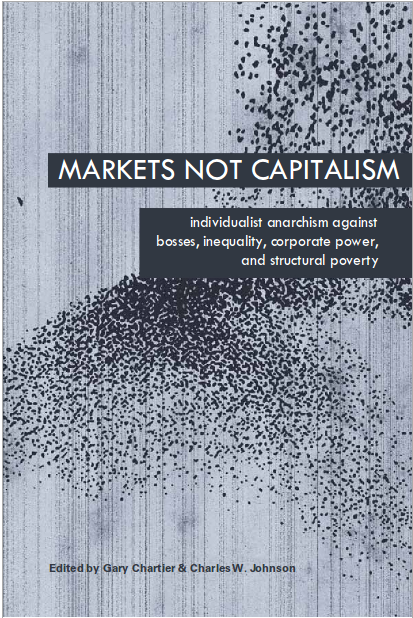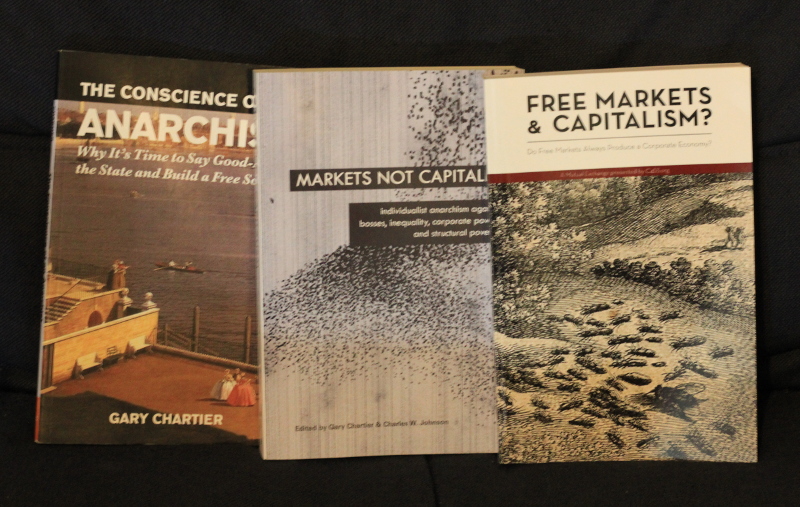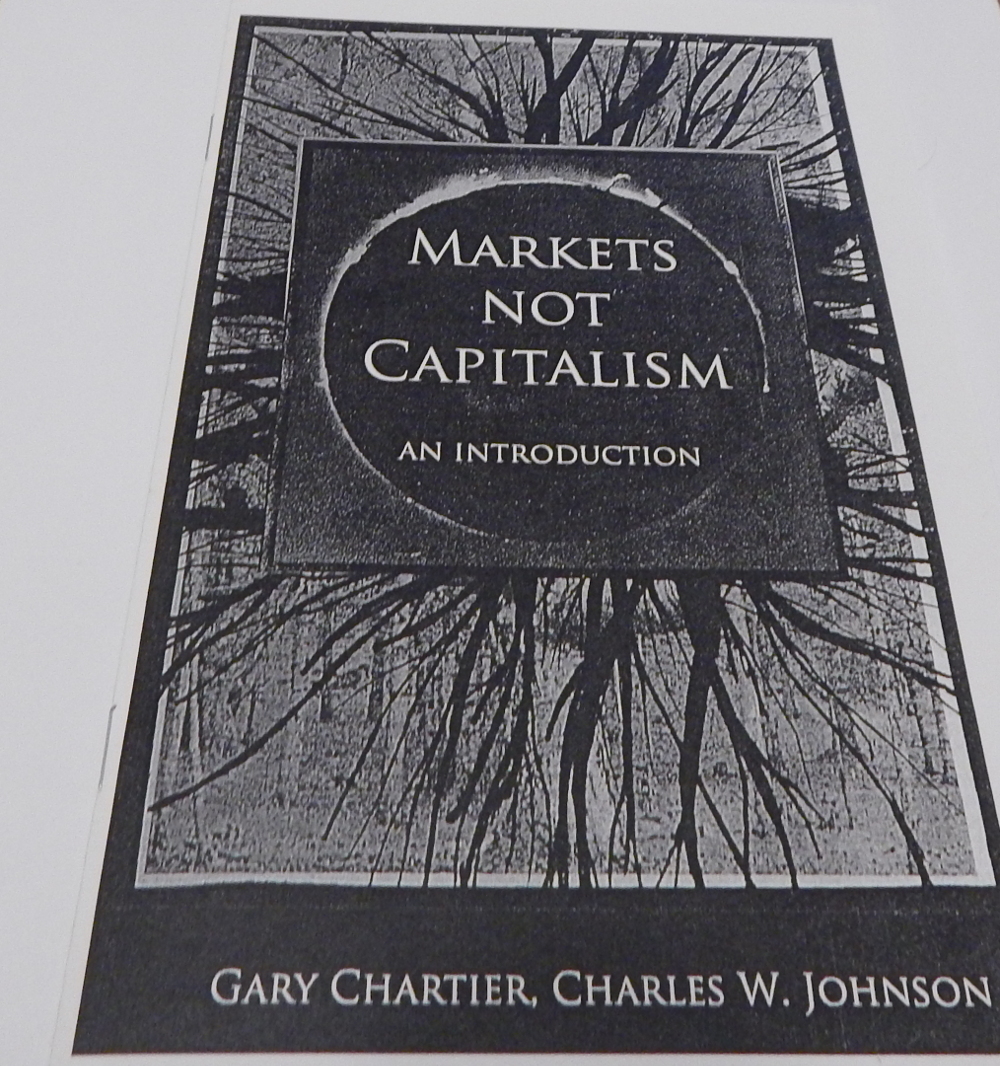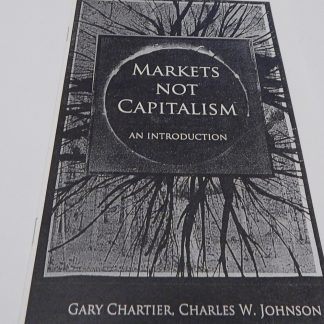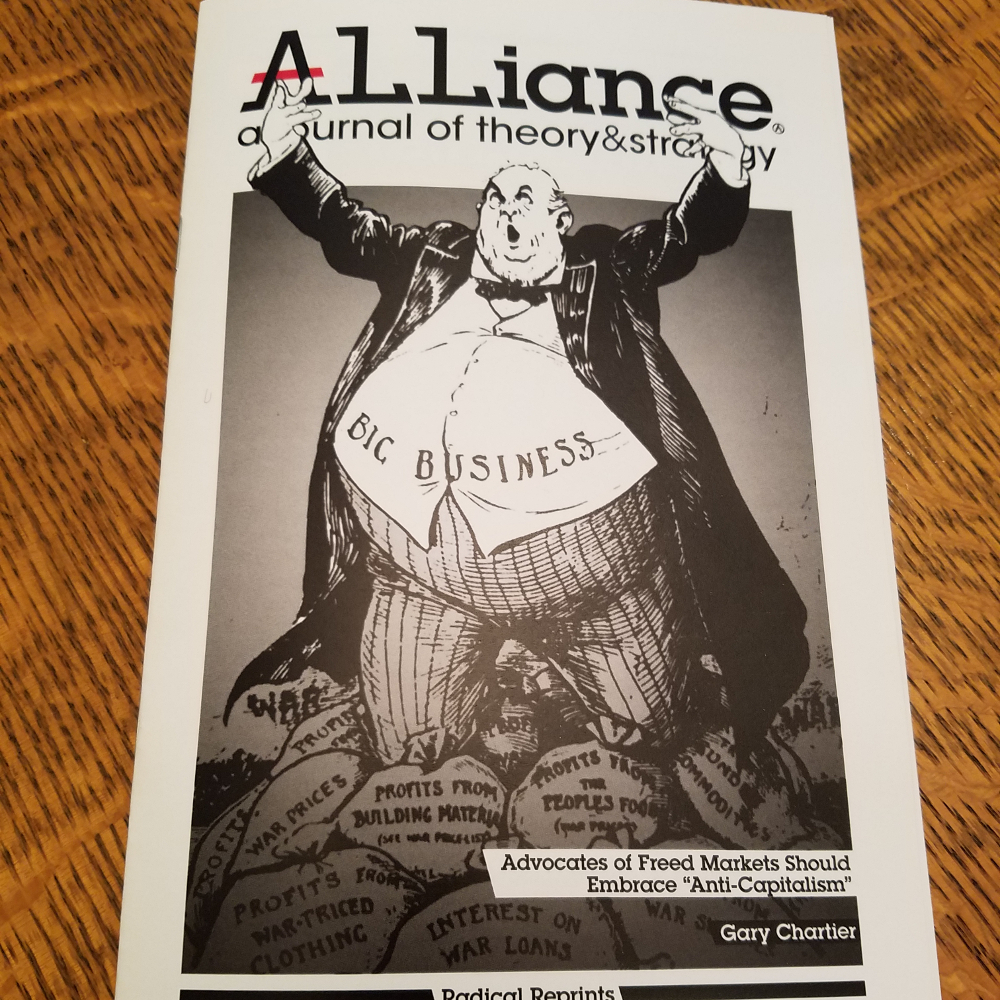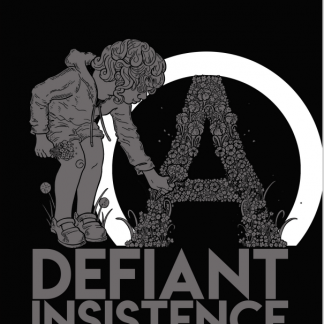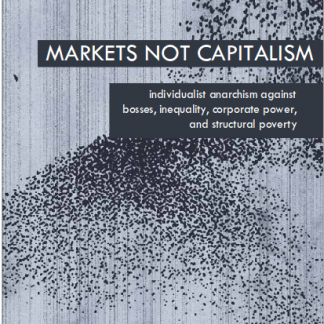Description
Published in November 2011 by Minor Compositions, an imprint of Autonomedia. Now available directly through this Distro.
Individualist anarchists believe in mutual exchange, not economic privilege. They believe in freed markets, not capitalism. They defend a distinctive response to the challenges of ending global capitalism and achieving social justice: eliminate the political privileges that prop up capitalists.
Massive concentrations of wealth, rigid economic hierarchies, and unsustainable modes of production are not the results of the market form, but of markets deformed and rigged by a network of state-secured controls and privileges to the business class. Markets Not Capitalism explores the gap between radically freed markets and the capitalist-controlled markets that prevail today. It explains how liberating market exchange from state capitalist privilege can abolish structural poverty, help working people take control over the conditions of their labor, and redistribute wealth and social power.
Featuring discussions of socialism, capitalism, markets, ownership, labor struggle, grassroots privatization, intellectual property, health care, racism, sexism, and environmental issues, this unique collection brings together classic essays by leading figures in the anarchist tradition, including Proudhon and Voltairine de Cleyre, and such contemporary innovators as Kevin Carson and Roderick Long. It introduces an eye-opening approach to radical social thought, rooted equally in libertarian socialism and market anarchism.
“We on the left need a good shake to get us thinking, and these arguments for market anarchism do the job in lively and thoughtful fashion.” – Alexander Cockburn, editor and publisher, Counterpunch
“Anarchy is not chaos; nor is it violence. This rich and provocative gathering of essays by anarchists past and present imagines society unburdened by state, markets un-warped by capitalism. Those whose preference is for an economy that is humane, decentralized, and free will read this book with – dare I use the word? – profit.” – Bill Kaufmann, author of Bye Bye, Miss American Empire
“It will be hard for any honest libertarian to read this book – or others like it – and ever again be taken in by the big business-financed policy institutes and think tanks. In a world where libertarianism has mostly been deformed into a defense of corporate privilege, it is worth being told or reminded what a free market actually is. Our ideal society is not ‘Tesco/Wal-Mart minus the State.’ It is a community of communities of free people. All thanks to the authors and editors of this book.” – Sean Gabb, director, UK Libertarian Alliance
“Libertarianism is often seen as a callous defense of privilege in the face of existing (and unjust) inequalities. That’s because it too often is. But it doesn’t have to be, and this fascinating collection of historic and current argument and scholarship shows why. Even readers who disagree will find much to think about.” – Ken Macleod, author of Fall Revolution
Contents
Part One: The Problem of Deformed Markets
- The Freed Market, William Gillis (2007)
- State Socialism and Anarchism: How Far They Agree, and Wherein They Differ, Benjamin R. Tucker (1888)
- General Idea of the Revolution in the Nineteenth Century (selections), Pierre-Joseph Proudhon (1851)
- Markets Freed from Capitalism, Charles Johnson (2010)
Part Two: Identities and Isms
- Market Anarchism as Stigmergic Socialism, Brad Spangler (2006)
- Armies that Overlap, Benjamin Tucker (1890)
- The Individualist and the Communist: A Dialogue, Rosa Slobodinsky and Voltairine de Cleyre (1891)
- A Glance at Communism, Voltairine de Cleyre (1892)
- Advocates of Freed Markets Should Oppose Capitalism, Gary Chartier (2010)
- Anarchism without Hyphens, Karl Hess (1980)
- What Laissez Faire? Sheldon Richman (2010)
- Libertarianism through Thick and Thin, Charles Johnson (2008)
- Socialism: What It Is, Benjamin R. Tucker (1884)
- Socialist Ends, Market Means, Gary Chartier (2009)
Part Three: Ownership
- A Plea for Public Property, Roderick T. Long (1998)
- From Whence Do Property Titles Arise? William Gillis (2009)
- The Gift Economy of Property, Shawn Wilbur (2008)
- Fairness and Possession, Gary Chartier (2011)
- The Libertarian Case against Intellectual Property Rights, Roderick T. Long (1995)
Part Four: Corporate Power and Labor Solidarity
- Corporations versus the Market, or Whip Conflation Now, Roderick T. Long (2008)
- Does Competition Mean War? Benjamin R. Tucker (1888)
- Economic Calculation in the Corporate Commonwealth, Kevin Carson (2007)
- Big Business and the Rise of American Statism, Roy A. Childs, Jr. (1971)
- Regulation: The Cause, Not the Cure, of the Financial Crisis, Roderick T. Long (2008)
- Industrial Economics, Dyer D. Lum (1890)
- Labor Struggle in a Free Market, Kevin A. Carson (2008)
- Should Labor Be Paid or Not? Benjamin R. Tucker (1888)
Part Five: Neoliberalism, Privatization, and Redistribution
- Free Market Reforms and the Reduction of Statism, Kevin A. Carson (2008)
- Free Trade is Fair Trade: An Anarchist Looks at World Trade, Joe Peacott (2000)
- Two Words on ‘Privatization,’ Charles W. Johnson (2007)
- What Are the Specifics? Karl Hess (1969)
- Confiscation and the Homestead Principle, Murray N. Rothbard (1969)
Part Six: Inequality and Social Safety Nets
- Let the Free Market Eat the Rich! Economic Entropy as Revolutionary Redistribution, Jeremy Weiland (2011)
- Individualism and Inequality, Joe Peacott
- How Government Solved the Health Care Crisis, by Roderick T. Long (1993)
- The Poverty of the Welfare State, Joe Peacott (1998)
Part Seven: Barriers to Entry and Fixed Costs of Living
- How ‘Intellectual Property’ Impedes Competition, Kevin A. Carson (2009)
- The American Land Question, Joseph Stromberg (2009)
- English Enclosures and Soviet Collectivization: Two Instances of an Anti-Peasant Mode of Development, Joseph Stromborg (1995)
- Health Care and Radical Monopoly, Kevin A. Carson (2010)
- Scratching By: How Government Creates Poverty as We Know It, Charles W. Johnson (2007)
Part Eight: Freed-Market Regulation: Social Activism and Spontaneous Order
- Regulation Red Herring: Why There’s No Such Thing as an Unregulated Market, Sheldon Richman (2009)
- We Are Market Forces, Charles Johnson (2009)
- Platonic Productivity, Roderick T. Long (2004)
- Libertarianism and Anti-Racism, Sheldon Richman (2010)
- Aggression and the Environment, Mary Ruwart (1993/2003)
- The Clean Water Act versus Clean Water, Charles W. Johnson (2010)
- Context-Keeping and Community Organizing, Sheldon Richman (2010)
